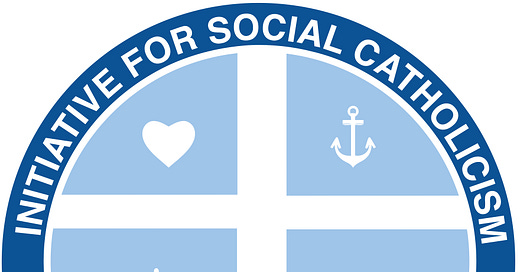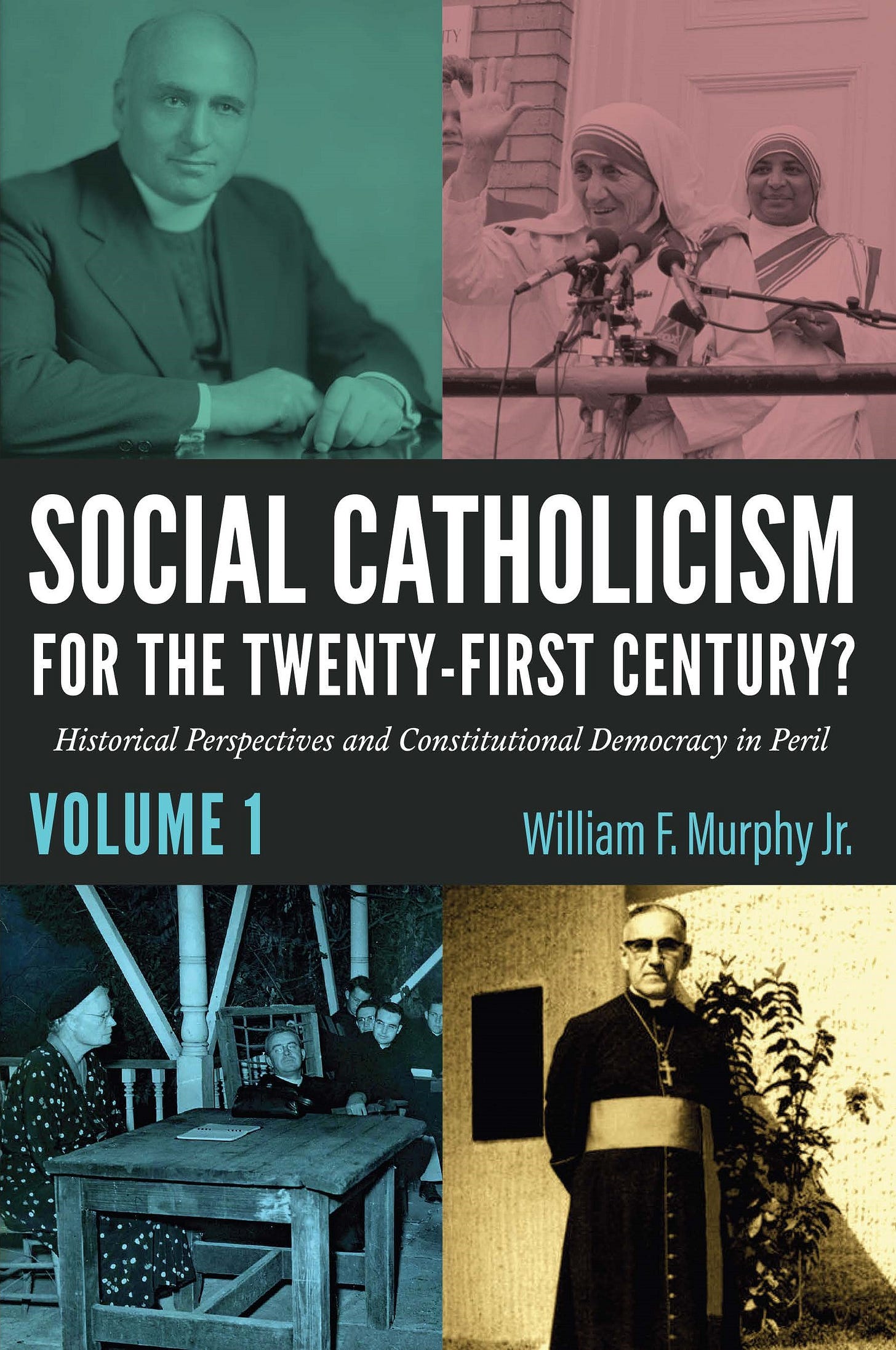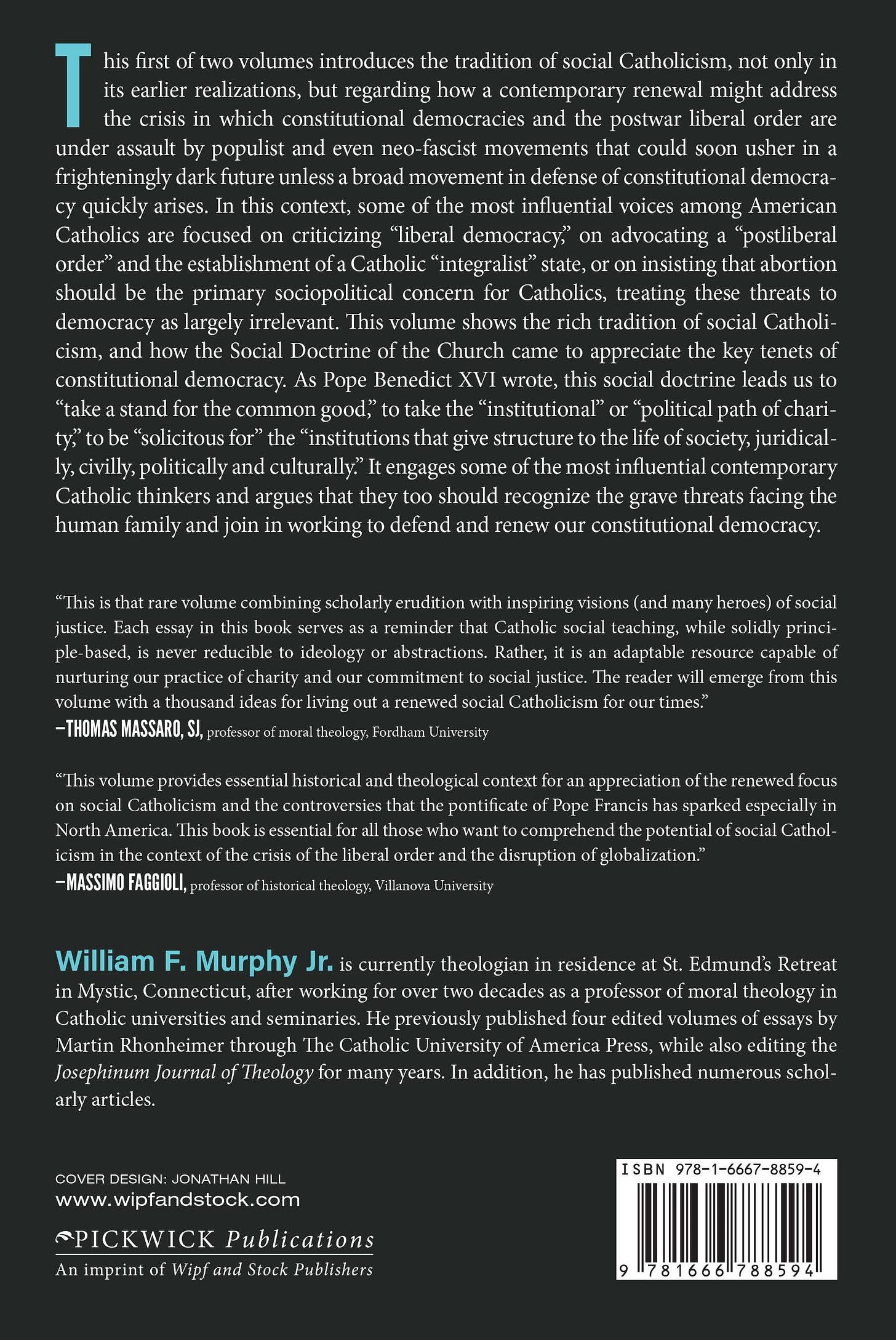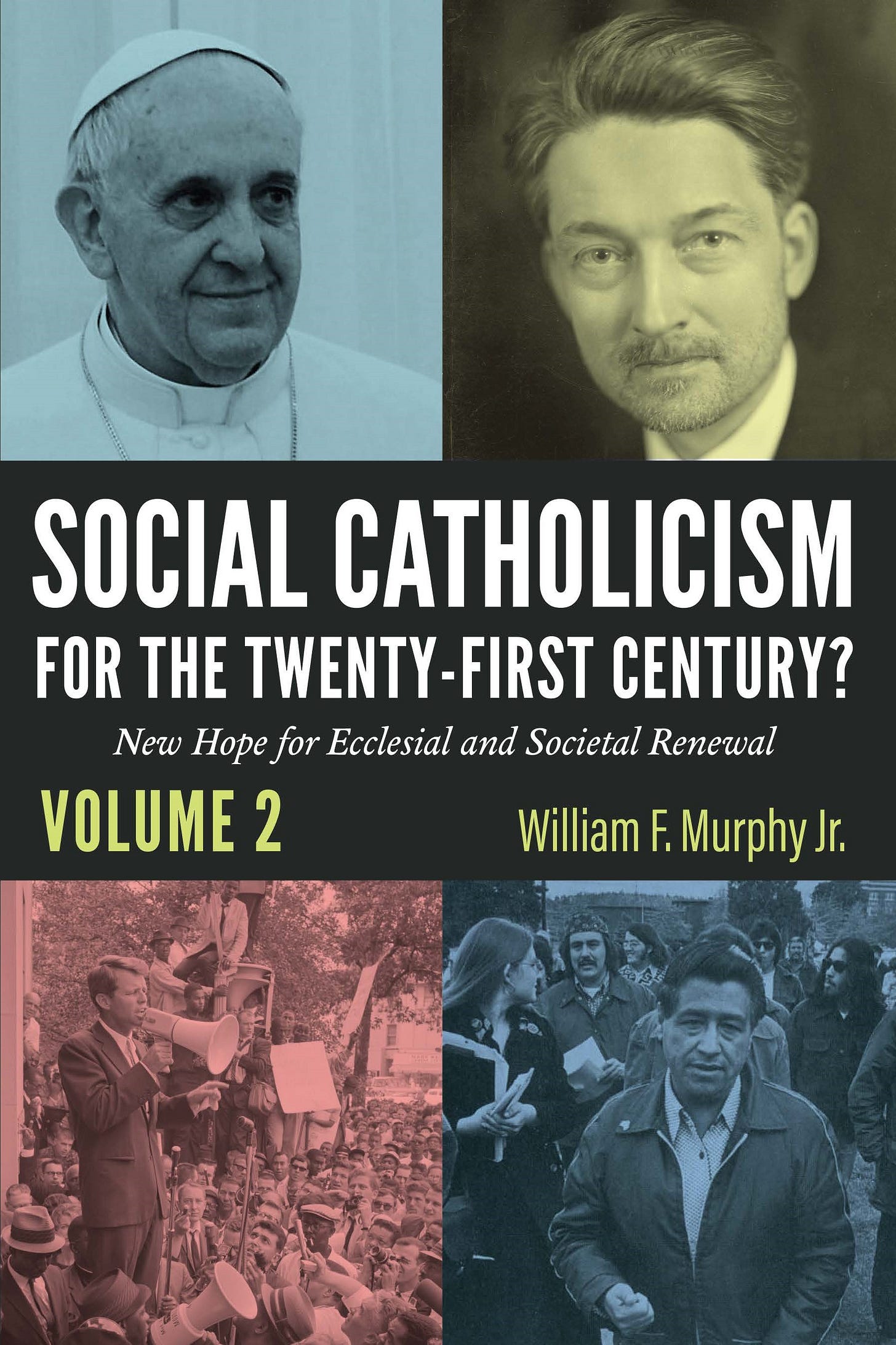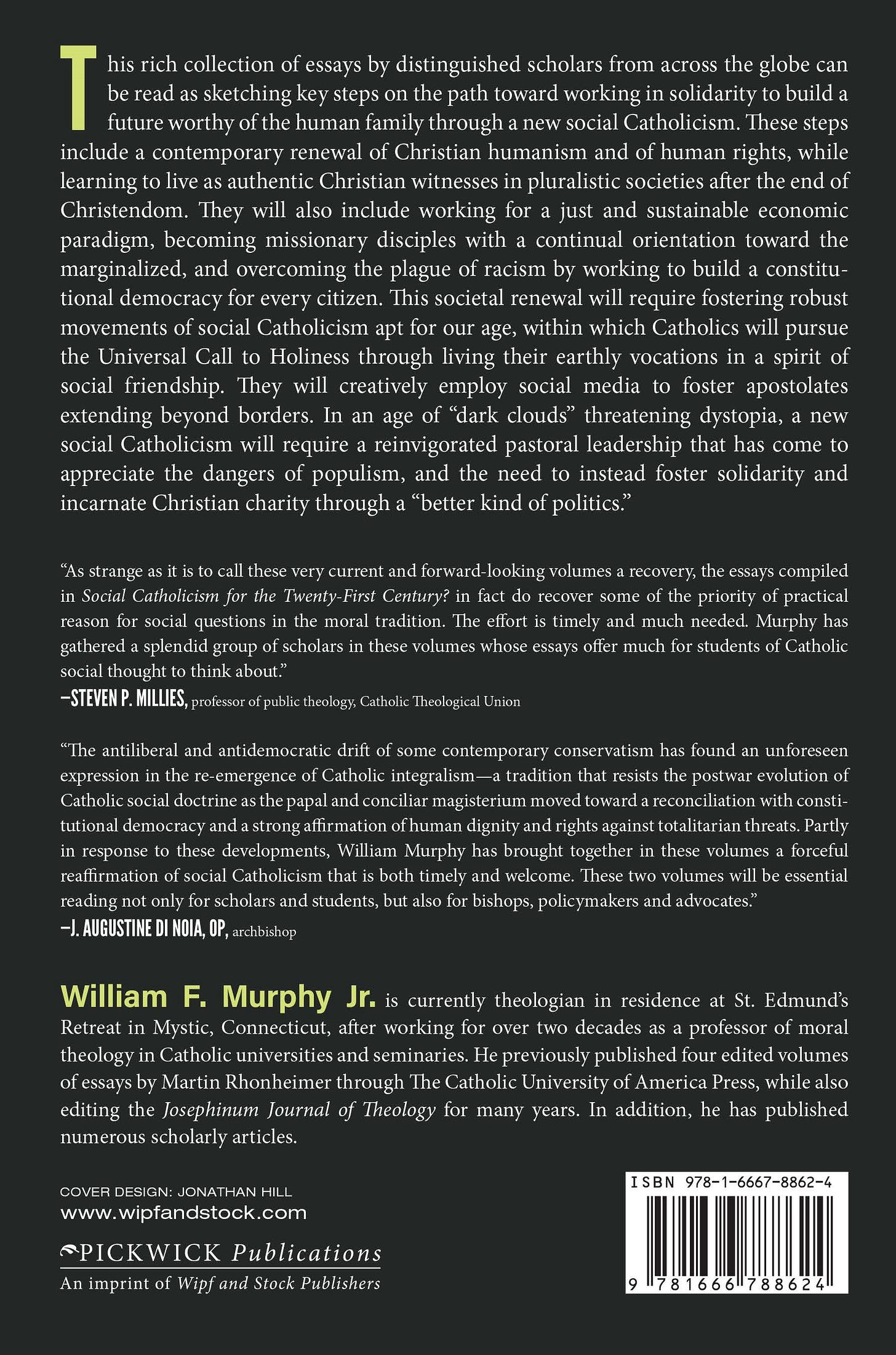This is the inaugural post for a substack seeking to foster a renewed living out of the authentic Social Doctrine of the Catholic Church,1 with a special focus on protecting and renewing contemporary constitutional democracy. It is written by someone who has come to appreciate this doctrine gradually after having spent the last quarter century teaching moral theology in Catholic seminaries and universities. This second vocation followed a career in business followed by graduate studies at the Dominican House of Studies and the Pontifical John Paul II Institute, inspired especially by the late Pope.
Social Catholicism and A Better Kind of Politics will not only show that this social doctrine is fully Catholic, with deep roots in Sacred Scripture, Tradition, the teaching office of the Church. It will also manifest the key characteristics of how social Catholicism has been lived fruitfully in the past. More importantly, it will provide an ongoing and wide ranging conversation regarding how it can be lived today so Catholics take their place in a broad collaboration to build a future worthy of the human family.
Readers may note that I borrow my subtitle A Better Kind of Politics from the title of chapter 5 of Pope Francis’s 2020 social encyclical Fratelli Tutti: On Fraternity and Social Friendship. This post’s title of Social Catholicism for the 21st Century?, on the other hand, refers to a just released two-volume edited collection that I introduce below, which is meant to provide the foundation for a broader project.
This broader project—which I am calling the Initiative for Social Catholicism and a Better Kind of Politics—proceeds from the conviction that there is great need and potential for the further realization of the “social Catholicism” that follows from living out Catholic Social Doctrine (CSD). The reference in my opening sentence above to “authentic” suggests that there is a need for critical assessment regarding not only how to interpret CSD, but how to live it out in response to the signs of the times.
This substack will have a particular focus, moreover, on providing intellectual support for a broader participation of Catholics in collaborative efforts to meet the grave—and arguably existential—challenges facing the human family at a pivotal time in human history. An important part of this support will be to argue that this “better kind of politics” is fully compatible with an authentic renewal of Catholic theology in contrast to a view that would see them as opposed.
This effort also proceeds from the conviction that such “social Catholicism” follows from what the Fathers of the Second Vatican Council wisely described—in their call for a renewal of moral theology—as “the obligation that is [ours] of bearing fruit in charity for the life of the world.”2 It proceeds from the conviction that this Social Doctrine of the Church reflects a treasury of wisdom about how to live the life of Christian charity in our rapidly changing modern world. This emphasis on informing our social and political engagement by charity is certainly not novel to Pope Francis but reflects the Great Tradition. It is reflected, moreover, in the main title of Pope Benedict XVI’s 2009 social encyclical Caritas in Veritate: On Integral Human Development in Charity and Truth. Benedict’s subtitle, on the other hand, indicates the alignment of this social teaching with a postwar humanism that emphasized the human rights and integral development consistent with human dignity.
This substack also proceeds from the fact that the living out of social Catholicism in the modern world of constitutional democratic states understandably took on a new priority with the embrace of Christian humanism in the postwar decades, which understandably followed from our tragic experience with fascism and the Second World War. This humanistic and democratic emphasis continued through the Second Vatican Council and in the social teaching and ministry of the last several popes, thereby navigating a course between ideological extremes as has our especially modern social tradition. The Church’s embrace of a humanistic social vision can also be seen in the content of a continual stream of social documents. Given this historical trajectory, the heading of “An Integral and Solidary Humanism,” under which paragraph no. 1 of the 2004 Compendium of the Social Doctrine of the Church introduces the topic, could not be more fitting.
After several decades of increasing association with the conservative side of the culture wars, however, this heading has been disconcerting for many American readers, at least those who seriously engaged with its meaning. This is all the more true as conservatism has increasingly become illiberal. Doesn’t Catholic social teaching prioritize “life issues” like abortion such that the essential priority for Catholics is to vote for “pro-life” Republicans and against “godless Democrats”? And don’t we Americans know better than those naive European socialists who somehow smuggled their ideas into the social encyclicals?
From many years of offering a graduate course on Catholic Social Teaching, I can attest to the fact that such views have been widespread among especially Anglo-Americans. The Catholic alignment of recent decades with conservative ideology and and increasingly radicalized Republican Party, moreover, presents grave obstacles to the reception of CSD, especially in a culture with well-funded media outlets and celebrity “influencers” monetizing fear and rage.
My conviction, however, is that many contemporary Catholics are alarmed by the radicalization of the right and should be open to a fresh and robust reconsideration of what has been called “the Church’s best kept secret.” If it wasn’t already clear, the need to do so should be more evident now that Donald Trump is positioning the Republican party against fundamental pro-life positions by promising to be very friendly to reproductive choice and to provide federal funding for IVF treatments.
This substack will also seek to manifest, moreover, that our social tradition should not be viewed through a hermeneutic of suspicion as if it reflected a “liberal” theology in tension with Christian orthodoxy. It will instead seek to show that CSD is deeply rooted in the inspired Scriptures, grows out of the living tradition of the Church, and reflects the indispensable discernment of the magisterium. This substack will further present CSD in light of the Catholic harmony between faith and reason, which puts us into what the 2004 Compendium of the Social Doctrine of the Church describes as “friendly dialogue with all sources of knowledge” (no. 76).
While welcoming all sources of insight, this substack will elucidate how this social tradition is especially wary of corruption by ideologies. As no. 390 of the Compendium warns, the distorting influence of ideologies is among the foremost obstacles to building societies marked by the civil friendship that CSD seeks to achieve. Given the polarization that mars contemporary social and ecclesial life, this substack will revisit this topic of ideological discernment in detail, as I have begun elsewhere. It will engage some of the best scholarship on ideology and encourage a critical evaluation of especially those ideologies that might hinder our reception of CSD.
Against a view that would contrast doctrinal orthodoxy and appreciation for our theological tradition with a robust commitment to living out our social doctrine, this substack will strive to show that they go hand in hand. On the one hand, I affirm that study and contemplation of the mysteries of the faith should follow naturally from coming to faith. On the other hand, it will argue that what I welcome as a contemporary renaissance of Catholic intellectual life—especially in Thomistic and ressourcement studies—will be of little value to the Church or human family if it is not accompanied by a proportionate renewal of an authentically Catholic social posture and apostolate.
This substack will similarly argue for the inherent interdependence between evangelization and social doctrine, such as we find in Chapter 2 of the Compendium, which is aptly entitled “The Church’s Mission and Social Doctrine.” That is to say that living out our love for God and neighbor by working for justice and the common good both follows from the gospel message and manifests its fecundity and integrity. Along these lines, I will argue that authentically Catholic efforts toward evangelization will robustly integrate this social Catholicism and what Pope Francis calls a “better kind of politics” to meet the challenges of our day.
My conviction, moreover, is that American Catholics would do well to recover the evangelical strategy articulated by Archbishop John Ireland. In his words, this was “to make America Catholic” precisely by taking the lead in solving the great social problems of the day, which were those following from the Industrial Revolution.
In our day, some of the most thoughtful voices speak of the global “polycrisis” which includes interlocking economic, social, political, geopolitical, psychosociological, technological, environmental and informational components. As I have argued elsewhere,3 the key to managing this crisis will be to have serious and competent leaders who will enable us to strengthen our institutions. This explains why I think the contemporary flirtation of leading conservative Catholics with antiliberalism and postliberalism—at a time when American democracy hangs in the balance—reflects a profound misreading of not only CSD but also of “the signs of the times.”
A recovery of this more authentically Catholic and effective approach to evangelization—working in solidarity to address the great social challenges of the day—can complement other approaches currently being advanced. It will also require, in my opinion, a significant socio-political realignment by the American Catholic Church from a stance tracing to the culture wars to one of Christian humanism. As I hope to discuss in future posts, such realignment would also allow the Catholic Church to better understand the concerns of younger Americans, many of whom are now widely abandoning the faith.
In what follows below, I will first briefly locate this substack within a broader initiative that I am working to launch. I will then introduce the two-volume edited collection that is meant to serve as the foundation for the initiative, and will also be a major topic of discussion in the substack.
The Initiative for Social Catholicism and a Better Kind of Politics
The substack is intended to be my most regular contribution to what I mentioned above as the Initiative for Social Catholicism and a Better Kind of Politics. Here the reference to “Social Catholicism” is meant to ground the initiative in the tradition of “social Catholics” who have lived out and fostered the development of modern CSD since especially the Industrial Revolution. In our time of widespread exhaustion with partisan polarization,4 which has given the noble task of political participation a bad name, the framing of a new social Catholicism as “a better kind of politics” may be attractive to people hungry for a hopeful path toward building a future worthy of the human family.
My hope is that many and varied collaborators will want to join together in the innumerable tasks that—through God’s help—can realize the potential of such an initiative. In a world where immense sums are invested in think tanks and media to advance alternative and problematic visions, I am aware of nothing remotely comparable to advance an authentically Catholic contribution to the conversation, especially one that would align with the discernment with our social tradition. My hope is that, with God’s help, more can be achieved than we might dare to imagine. To appropriate the wise advise of Gamaliel in Acts 5, if such hope is “of human origin, it will fail” (5:38) but “if it is of God” (5:39) we can hope to see abundant fruits.
There are, of course, numerous other initiatives doing excellent work in living out Catholic Social Teaching and even advancing a Catholic social vision. And many outside our tradition are doing important work in service of the common good with which Catholics can and should collaborate. I think, however, that there are major gaps that must be filled if the Church is to be the salt, light and instrument of unity she needs to be if she is to play her part in keeping the contemporary world from degrading into a dystopian future.
These gaps include whatever is needed to enable the Church in especially the United States to more fully appreciate and incarnate CSD. This includes, for example, helping the “institutional infrastructure” of the Church—starting with the clergy, seminarians, journalists, and professors—to appreciate the fullness of CSD and how it would have us working in collaboration for the common good. Such work would start, in my opinion, with efforts to preserve and renew American democracy, precisely because of the importance of such renewal to managing the global polycrisis. Besides that, we will have to see what doors will be opened by Divine Providence.
The logo for this fledgling initiative is included below and is meant to invite prayerful consideration.
Social Catholicism for the Twenty-First Century? Volumes 1 & 2
The foundation for this Initiative for Social Catholicism and a Better Kind of Politics is a two-volume edited collection entitled Social Catholicism for the Twenty-First Century? The subtitle for Volume 1 is Historical Perspectives and Constitutional Democracy in Peril, and its front cover is included below.
Starting from the top left, the first picture is of Msgr. John A. Ryan who was arguably the most influential social Catholic in American history. His life and work are considered here primarily as an example of the social formation that prepared him to recognize and respond to the signs of his times. Contemporary American Catholics could learn much from his formation and subsequent work. This would include how he came to understand the machinations of plutocrats of his day, who controlled the political process and manipulated the press to the detriment of the many. It would also include how he came to recognize the place of the state in providing public goods that markets would not provide.
The other figures on the cover above are not treated in the volumes. They are included on the cover, however, as more recent and recognizable figures who stand within the tradition of social Catholicism by bringing justice and God’s loving mercy to the people of their times and places. Mother Theresa of Calcutta, for example, is included on the top right for her exemplification of the special concern for the poorest and most vulnerable that is an essential mark of CSD. Dorothy Day, who is in the lower left corner, is known by many American Catholics. They may have encountered the Catholic Worker movement that Day co-founded or they may have seen her portrayed on film. Her life is a fascinating story of a longing for justice, of sin, of conversion, and of the heroic struggle for social reform through journalism, activism and direct service to the poor. Also noteworthy is Day’s clear-eyed rejection of fascism during the interwar period when many Catholics in Europe and the United States either embraced or tended toward it, while only a minority spoke out against it.
Bishop St. Oscar Romero, pictured in the lower right, is another who was chosen for the cover as someone with whom many aspiring social Catholics might be able to relate. Upon being made bishop, he was initially seen by socially concerned priests of his new diocese as more traditional and unlikely to sympathize with the plight of the poor who they were assisting by drawing upon the new and controversial “liberation theology.” Romero’s spiritual life, moreover, was nourished by the spirituality of Opus Dei which was seen as opposed to liberation theology.
His extraordinary ministry, however, began with the interior reform that his spirituality prescribed, but radiated outward from there. It was guided by an authentically Catholic theology of liberation, such as the one the Congregation for the Doctrine of the Faith under Prefect Josef Cardinal Ratzinger would later elucidate.5 From his interior sanctity and sound social doctrine flowed not only special care for the most poor and marginalized, but courageous denunciation of the abuses of the military regime in El Salvador, leading to his martyrdom and to widespread recognition of his heroic sanctity.
The back cover of Volume 1 can be found below and includes a synopsis, two endorsements and some concise biographical information about the editor. The synopsis highlights the contrast between the way our social tradition has embraced and supported the institutions of constitutional democracy and the way influential American Catholics have emphasized radical critiques of “liberalism” that would seem to align Catholicism with today’s antidemocratic forces, including aspiring autocrats. Such attacks on liberal democracy, as I have argued elsewhere, are not what follows from the last several decades of CSD as understood by the magisterium of the Church. What follows from this doctrine is well-captured by the texts cited on the back cover below by Pope Benedict XVI on the “institutional path,” which—in my opinion—would have have Catholics in the forefront of those working to protect and renew American constitutional democracy.
Another endorsement reads as follows:
These two volumes promise to upend and reconfigure the discussion of Catholic social teaching. Deeply sympathetic to the papacies of John Paul II and Benedict XVI, Professor Murphy shows how their thought is organically affirmed and developed by Pope Francis. Most importantly, the essays incisively critique the dangerous and growing liaison between hard right Catholics and antidemocratic authoritarianism. No one interested in the political influence of Catholics in the United States can afford to miss this two-volume set.
Cathleen Kaveny
Darald and Juliet Libby Professor of Law and Theology
Boston College
The preface to this first volume provides a detailed discussion of how this project grew out of my graduate education as a “JP2 Catholic” during the 1990s as the Pontificate of St. John Paul II reached its high point with as I completed my doctorate during the Great Jubilee Year of 2000.
The cover of Volume 2 is included below. In the top left it features Pope Francis, whose underappreciated development of the Christian humanism of CSD in response to the signs of our times is discussed by multiple essays in the collection. On the top right is the French Catholic philosopher Jacques Maritain who was arguably the most significant figure in the postwar development of CSD, especially by helping us to embrace a stance of Christian humanism and support for constitutional democracy.
Given the contemporary renewal of Thomistic studies in especially the United States, Maritain is important in another way. He was a central figure in an early 20th Century Thomistic renaissance in France, which aligned with the reactionary, monarchist, nationalist, integralist and right-wing political movement Action Française. When Pope Pius IX condemned Action Française, however Maritain worked with his former student Yves Simon to reconcile Thomism and Catholicism with democracy, a work that bore good fruit after the war. Until the rotten fruits of fascism were evident by the end of the war, however, Maritain and Simon were lonely voices in support of democracy among Catholic intellectuals, especially Thomists.
After the war, however, Catholics increasingly played central roles in rebuilding Europe based on democratic models. A major hope of my Initiative for Social Catholicism and a Better Kind of Politics is that many Catholic intellectuals and others will become champions of democracy like Maritain, Simon, and the postwar Catholic social tradition.
The bottom figures on the cover—Robert F. Kennedy and Caesar Chavez—are not treated in the book, but are examples whose work for social justice in the United States was deeply motivated by their Catholic faith.
The back cover for Volume 2 follows below.
These volumes can be purchased from Wipf & Stock or book sellers.
In my next post, I will briefly outline some of the topics I plan to cover in the substack before discussing Bishop Wilhelm von Ketteler, who is widely considered the father of modern Catholic social teaching. I hope you will subscribe to the newsletter, and tell others about it. I expect to post more modestly sized pieces with relative frequency, especially over the upcoming months. The subscriptions will free, at least to start, as I explore the level of interest in such a thing. There will also be various opportunities to support this work, however, whether through intellectual collaboration, financial support—which will be vital to its continuation and expansion—or other means.
I generally employ the terminology of Catholic Social Doctrine (CSD), following the emphasis of the magisterium since Pope St. John Paul II, especially to emphasize that it is part of the deposit of faith and to be received as such. Keeping this caveat in mind, the terminology can be used interchangeably with that of Catholic Social Teaching (CST). We can see the preferred terminology in the title of the 2004 Compendium of the Social Doctrine of the Church, published at the request of this pontiff by the Pontifical Council for Justice and Peace to provide a systematic overview and synthesis of the documentary heritage of our social tradition. https://www.vatican.va/roman_curia/pontifical_councils/justpeace/documents/rc_pc_justpeace_doc_20060526_compendio-dott-soc_en.html.
Second Vatican Council, Optatam Totius: Decree on Priestly Training, no. 16. https://www.vatican.va/archive/hist_councils/ii_vatican_council/documents/vat-ii_decree_19651028_optatam-totius_en.html.
See my “Introduction” to Social Catholicism for the 21st Century? Volume 1 Historical Perspectives and Constitutional Democracy in Peril (Eugene: Wipf & Stock, 2024).
Against such talk of polarization, there is considerable consensus on the key political questions but the issues are being manipulated through various forms of propaganda for the sake of partisan and plutocratic advantage.
See congregation’s 1986 “Instruction on Christian Freedom and Liberation,” at https://www.vatican.va/roman_curia/congregations/cfaith/documents/rc_con_cfaith_doc_19860322_freedom-liberation_en.html.


